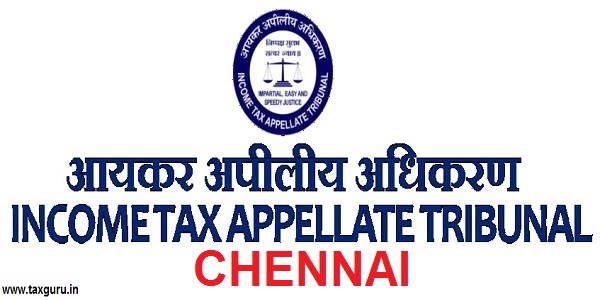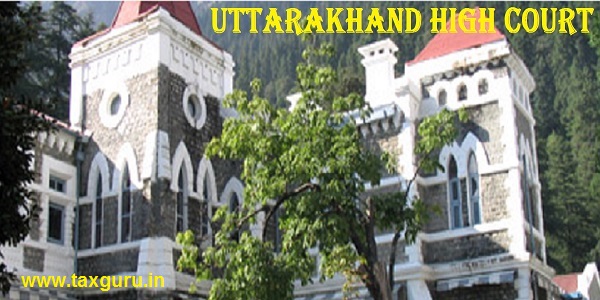Case Law Details
Dr. S. Muthian Vs ACIT (ITAT Chennai)
Sec.143(3) of the Act contemplates two methods of assessment being made vis-a -vis a return filed by an assessee. Wherever, the AO wants to scrutinise the return of income, he has to issue notice u/s.143(2) of the Act so as to complete the assessment u/s.143(3) of the Act. If the AO does not find any serious discrepancies or does not disbelieve any facts and figures mentioned in the return, he can simply issue an intimation u/s.143(1) of the Act by making prima facie adjustments. However, where the AO doubts the correctness or accuracy of the facts and figures mentioned by the assessee as compared to the any information in the return, he could correct the same by processing u/s.143(1) of the Act. In other words, if any incorrect claim, if such incorrect claim is apparent from any information in the return, he should correct the same while processing the return u/s.143(1) of the Act. In the instant case, the assessee claimed exemption of substantial amount which was in the form of sale of stock option in USA. However, the Form No.16 annexed to the return of income issued by the present employee of the assessee shows that the stock option received by the assessee was liable for tax and it was subject to TDS by Google India Pvt Ltd., Bangalore and they have deducted the TDS on the same. This is being so, the AO while processing the return u/s. 143(1) of the Act included the income from sale of stock option as income of the assessee. Now the assessee claimed that it could not have been done by the AO at the stage of prima facie adjustments u/s. 143(1) of the Act. In our opinion, when the information is available on record by way of Form No.16 annexed to the return of income the AO cannot keep quiet without making corrections while processing return u/s.143(1) of the Act. In our opinion, the AO is within his jurisdiction in considering the income from sale of stock options as income of assessee which is evident from the Form No.16 attached with the return of income. Being so, we do not find any infirmity in the order of lower authorities.
Also Read-
| Dr. S. Muthian Vs ACIT (Madras High Court); Tax Case (Appeal) No. 379 of 2017; 05/02/2021;2010-11 | Tax on gain on sale of ESOP in USA given to Indian employee by Google Inc USA- HC remit matter back to AO |
| Dr. Muthian Sivathanu, Vs ACIT (ITAT Chennai); I.T.A.No.553/CHNY/2018; 24/10/2018; 2011-12 | Gains on sale of shares allotted under ESOP is capital gain not perquisite |
FULL TEXT OF THE ITAT JUDGEMENT
The assessee has filed an appeal against the order of CIT(A) – 5, Chennai in ITA No. 334/13-14 dated 15.04.2015 and Raised the grounds that the Ld. CIT(A) erred in confirming the order of the Assessing Officer and not considered the facts that the stock options income has accrued and received outside India and ignored the status of assessee as Not Ordinarily Resident and the provisions of section 5(1)(c) of the Act.
2. The Brief facts of the case that the assessee is a salaried employee and filed Return of income for the assessment year 2010-11 disclosing total income of Rs. 75,70,698/-. Subsequently, Return of income was processed u/s. 143(1) of the Act with Addition of Rs. 1,19,49,709/- in respect of stock options earlier allotted and sold in USA in the financial year 2009-10. The contention of the Ld. AR after filing of the Return of income, the assessee has furnished the details and Documents of the “stock options” allotted irrespective of assessment or notice from Jurisdictional Assessing Officer. The Ld. AR submitted that the status of assessee in financial year 2009-10 is Not Ordinarily Residence (NOR) and supported with endorsement on the passport. The assessee was employed in USA during the period August 2000 to October 2008 and as per the provisions of section 6(6)(a) of the Act, the status of the assessee is Not Ordinarily Resident as he was Resident in India for 401 days only for the preceding 7 years from April 2002 to 31st March 2009 as against stipulated conditions of 730 days. The assessee started his career working in Google Inc, California, USA from the month of June 2005 and was allotted 5500 stock options with the strike price of $ 274.80 each option and the stock options has vesting schedule over a period of time and assessee has opted stock options from said period. In October 2008, the assessee left USA and employed with Google India (P) Ltd., owned by Google Inc. USA. The assessee was vested aggregate 4500 stock options till financial year 2009-10. The assessee sold 900 stock options vested to him before coming to India on employment for $ 2,53,480 equal to Rs. 1,19,49,709/-. Whereas the above transaction of sale of stock options was executed through Smith Barney Inc. USA and proceeds are directly credited to the assessee’s old Bank account in USA and Bank statement identifying the credits was filed with Assessing Officer. Whereas, M/s. Google India (P) Ltd while issuing Form No. 16 for the assessment year 2010-11, disclosed the stock options transactions and deducted tax at source (TDS). Whereas, the assessee filed the Return of income for assessment year 2010-11 excluding the sale transaction of stock options as the assessee being a Not Ordinarily Resident (NOR) and claimed refund of Rs. 36.92.337/- but Return of income was processed u/s. 143(1) on 15.03.2012 with addition of Rs. 1,19,49,709/- and determined of Rs. 120/- as payable.
3. Aggrieved by the intimation u/s. 143(1) of the Act, assessee filed an appeal with Commissioner of Income Tax (Appeals). The Appellate Authority has received the information filed by the assessee on the various dates. The contention of the Ld. CIT(A) that the assessee has filed letters but not represented the case and also filed written submissions and has not prosecuted the case through Authorised Representative or party in person. The Ld. CIT(A) on perusal of the information adjudicated the disputed issue and disposed off the appeal. The Ld. CIT(A) has dealt the issue on merits where the stock options are taxable in India, irrespective of assessee residing outside the India and the purchases and sale of stock options was outside the India. Whereas, Google India Private Ltd. employer of the assessee included stock options sale in the value of perquisite and deducted tax at source. The assessee has filed the Return of income excluding the income of stock options, and claimed refund of Rs. 36,92,237/-. The assessee explained that the consideration on sale of stock options was received in USA before joining the employment in Google India Private Ltd. Therefore, cannot be considered as perquisite under provisions of section 17(2) of the Act, whereas Ld. CIT(A) relied on Tribunal special bench decision in Sumit Bhattacharya Vs ACIT (2008) 300 ITR (AT) 347, (Mumbai), where sum received on sale of stock options is taxable in India and dismissed the appeal. Aggrieved by the order, the assessee has assailed an appeal before the Tribunal.
4. Before us, the Ld. AR of the assessee reiterated the submissions filed with the Jurisdictional Assessing Officer and Appellate Authority and stated that the Ld. CIT(A) erred in treating stock options as income even though assessee is Not Ordinarily Resident in India and overlooked scope of income and Residential state under the provisions of section 5 and 6 of the Income Tax Act for taxation purpose. The Ld. AR relied on Delhi High Court decision in the case of CIT Vs. Anantha Jain ITA No. 165/2009 dated 24.04.2012 wherein held that:-
“It is clear from the factual findings recorded by both CIT(A) and the Tribunal that the payment in question was received towards retirement benefit/severance/vacation engagement from the erstwhile employer on termination of employment in November, 1999. The erstwhile employer was based in USA and services were rendered to the erstwhile employer in USA. In view of the aforesaid factual position, elucidated and accepted by both the CIT(A) and the Tribunal, we do not think the said amount can be taxed in India, as the status of the respondent-assessee during the year in question was that of “Not Ordinary Resident”. The said income did not accrue or arise in India. The Tribunal has rightly held that in terms of Section 6 and Section 9(1)(ii) of the Act, the amount/income had not accrued/deemed to be accrued/paid in India. The questions o f law are accordingly answered in the affirmative, that is, against the Revenue and in favour of the assessee. The appeal is dismissed with no order as to costs.”
4.1 He also relied on judgment of Supreme Court in the case of CIT Vs Morgenstern Werner (2003), 11 Supreme Court Cases 445 dated 24.10.2002 where income earned outside India cannot be taxed in the hands of person Not Ordinarily Resident in India.
4.2 The Ld. AR argued that the Residential status of assessee for assessment year 2010-11 is as “Not Ordinarily Resident in India” and Income earned on sale of stock options in USA is not liable for taxation in India. The assessee has sold stock options allotted in USA during his stay in USA and subsequently shifted to India and joined employment with Google India Private Ltd. Whereas, Indian employer treated such sale of stock options as perquisite and deducted TDS and issued Form No. 16 for assessment year 2010-11. The assessee should have disclosed his Residential status to the employer and then Form No. 16 should have been obtained, but due to difference in income offered in Return of income and Form No. 16, the Assessing Officer has passed intimation u/s. 143(1) considering the perquisite of stock options and determined tax payable to Rs. 120/-.
5. We heard the rival submissions, perused the material on record and judicial decisions. In this case, the assessee filed return of income on 31.07.2010 declaring total income of Rs.75,70,698/- and claimed refund of Rs.36,92,337/- The return was processed u/s.143(1) of the Act on 15.3.2012 and income was determined at Rs.1,95,20,410/- by denying the exemption claimed by the assessee towards receipt at Rs.1,19,49,709/- said to be sale of stock options granted in the U.S.A while he was working in Google Inc. USA. Thus there was a demand of Rs.120/- towards tax outstanding. Now, the argument of the Ld. AR is that assessee being “Not Ordinary Resident in India”, sale of stock options in USA is not taxable in India.
5.1 It is to be noted that Sec.143(3) of the Act contemplates two methods of assessment being made vis-a -vis a return filed by an assessee. Wherever, the AO wants to scrutinise the return of income, he has to issue notice u/s.143(2) of the Act so as to complete the assessment u/s.143(3) of the Act. If the AO does not find any serious discrepancies or does not disbelieve any facts and figures mentioned in the return, he can simply issue an intimation u/s.143(1) of the Act by making prima facie adjustments. However, where the AO doubts the correctness or accuracy of the facts and figures mentioned by the assessee as compared to the any information in the return, he could correct the same by processing u/s.143(1) of the Act. In other words, if any incorrect claim, if such incorrect claim is apparent from any information in the return, he should correct the same while processing the return u/s.143(1) of the Act. In the instant case, the assessee claimed exemption of substantial amount which was in the form of sale of stock option in USA. However, the Form No.16 annexed to the return of income issued by the present employee of the assessee shows that the stock option received by the assessee was liable for tax and it was subject to TDS by Google India Pvt Ltd., Bangalore and they have deducted the TDS on the same. This is being so, the AO while processing the return u/s. 143(1) of the Act included the income from sale of stock option as income of the assessee. Now the assessee claimed that it could not have been done by the AO at the stage of prima facie adjustments u/s. 143(1) of the Act. In our opinion, when the information is available on record by way of Form No.16 annexed to the return of income the AO cannot keep quiet without making corrections while processing return u/s.143(1) of the Act. In our opinion, the AO is within his jurisdiction in considering the income from sale of stock options as income of assessee which is evident from the Form No.16 attached with the return of income. Being so, we do not find any infirmity in the order of lower authorities.
5.2 The ld. AR made one more plea before us that the CIT(A) failed to adjudicate certain issue relating to the status of the assessee and also relating to the taxability of the stock option. In our opinion, these are debatable issue cannot be dealt u/s.143(1) of the Act and what cannot be done directly, the same thing cannot be done indirectly. Further, the reading of the whole order of the CIT(A) gives the impression that the CIT(A) has considered the entire facts and circumstances of the case on the basis of the written submissions filed before him, though the assessee was non-cooperative. It is to be mentioned herein that the order of the lower authorities has not to be scrutinised sentence by sentence merely to find out whether all facts have been set out in detail by CIT(A) or whether some incidental fact has not been noticed by the CIT(A) in his order. If the Tribunal on a fair reading of the Order of the CIT(A), finds that it has taken into account all relevant material and has not taken into account any irrelevant material in basing his conclusions, the decision of the CIT(A) is not liable to be interfered with, unless, of course, the conclusions reached at by the CIT(A) are perverse. It is not necessary for the Appellate Authority to state in its order specifically or in express words that it has taken into account the cumulative effect of the circumstances or has considered the totality of the facts, as if that were a magic formula; if the order of the CIT(A) shows that it has, in fact, done so, there is no reason to interfere with the decision of the CIT(A). Accordingly, we have no hesitation to confirm the order of the CIT(A) on the issue before us.
6. In the result, the appeal of the assessee is dismissed.
Order pronounced on Friday, the 16th day of December, 2016 at Chennai.






























Also Read-
Dr. S. Muthian Vs ACIT (Madras High Court) – Tax on gain on sale of ESOP in USA given to Indian employee by Google Inc USA- HC remit matter back to AO”
For getting a good grip in a holistic manner, suggest to read also the posted Comment (s) / critique on that report of HC Judgment .
ADMN: Great job done; to give it a finishing touch , however, suggest to have displayed, also the ITAT Order in the very same case for the succeeding AY 2011- 12, remanding the closely related matter of dispute back to AO – present status of which is not known !
ADMN : To enable you to do so, sending the LINK to that Order (reported elsewhere) , once again via e’mail !
courte